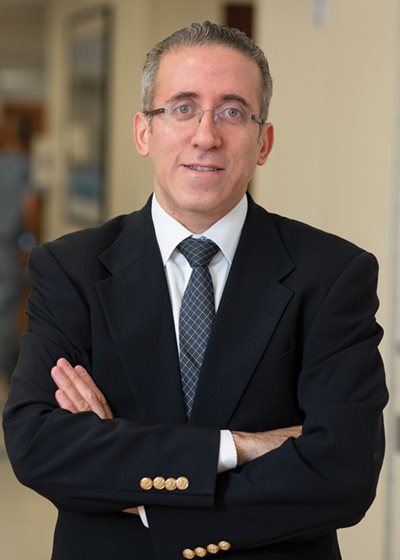 Hospital medicine is the fastest-growing specialty in the history of medicine. But that’s not why it appeals to Michael Soliman, MD, an adult hospitalist. He appreciates having the time with inpatients to review their history and sometimes identifies problems that need further investigation.
Hospital medicine is the fastest-growing specialty in the history of medicine. But that’s not why it appeals to Michael Soliman, MD, an adult hospitalist. He appreciates having the time with inpatients to review their history and sometimes identifies problems that need further investigation.
When did you realize you wanted to become a physician?
There are a few physicians in my family. Growing up, I was really good in mathematics, and everyone thought of me as a numbers guy who would go into engineering. I always enjoyed dealing with people, and I surprised them by going to medical school. In Egypt, it is very competitive to get into medical school. I was fortunate to attend the University of Alexandria, one of the top medical schools in Egypt.
Training was very different than it is here. Residency was truly “residency”: you packed a bag and lived at the hospital — no social life, no family.
At times, I was the only physician for 60 patients overnight, and they had high acuity. Here we have rapid response teams; over there, it was only me doing chest compressions and giving intra-cardiac adrenaline by myself. It was quite an experience, but you come out of it well trained.
Why did you decide to move to the U.S.?
I always thought I would move here. I was in the army for a couple of years; it is mandatory in Egypt. I was stationed in a military hospital in the desert, where I saw local residents, including lots of individuals with serious trauma. I was a general practitioner, and I realized I wasn’t going to get specific training in one field. I finished the army and, two weeks later, I left for the U.S., where I could get more training. The things that I have noticed about medicine in the U.S. are the use of evidence-based medicine and the strong emphasis on social skills.
You had further training to become an internist?
Yes. I did outpatient care for a short while, and I learned that I did not like it. That is why I focused on hospital medicine. I like the action in the hospital, the acuity of the patients and the time you can spend with the patient. You can re-evaluate their outpatient history, see what medications they’re on and look at the whole picture. Inpatient care is my forte.
I like to take the necessary time to talk to everyone involved in the patient’s care — the patient, the patient’s doctor, the family — especially when I’m caring for older patients. When you’re a hospitalist, you shouldn’t leave any stones unturned. That’s why I like Emerson, which has a very high standard compared to other hospitals.
For example, I had a patient with long-standing shortness of breath, and I recommended that she have her renal artery checked. I have then arranged for her to see a specialist, who determined she had renal artery stenosis and inserted a stent. She’s fine now.
Hospitalists play critical roles in helping hospitals meet quality and safety measures.
Yes, we report system issues and try to find ways to fix them. Then there are the metrics required by insurance companies and Medicare that we must comply with. For example, we need to report all of our patients’ A1C levels as part of the national patient outcomes measures. All hospitalists have a dashboard showing how many patients we saw, our seven-day readmission rate and 30-day readmission rate. This is an important quality measure.
You must work closely with Emerson specialists.
Yes, all the time, including on transitions of care to ensure that the patient will be seen within a week of discharge. We need to make a good plan for the patient, because they may not be able to see their primary care physician in time. We are a community hospital; we know what we’re good at, and when a patient needs tertiary care, we get them there. I have a lot of confidence in Emerson. My family comes here for care.
What do you enjoy in your time off?
I like to travel. One of the places we love is London and the suburbs of London, including Windsor. It’s beautiful there. We also enjoy the islands in the Caribbean. When I’m not working, I coach soccer, and I’m a den leader for Cub Scouts. Both of my sons are Cub Scouts. Growing up in Egypt, I was a Boy Scout, even up to college.

